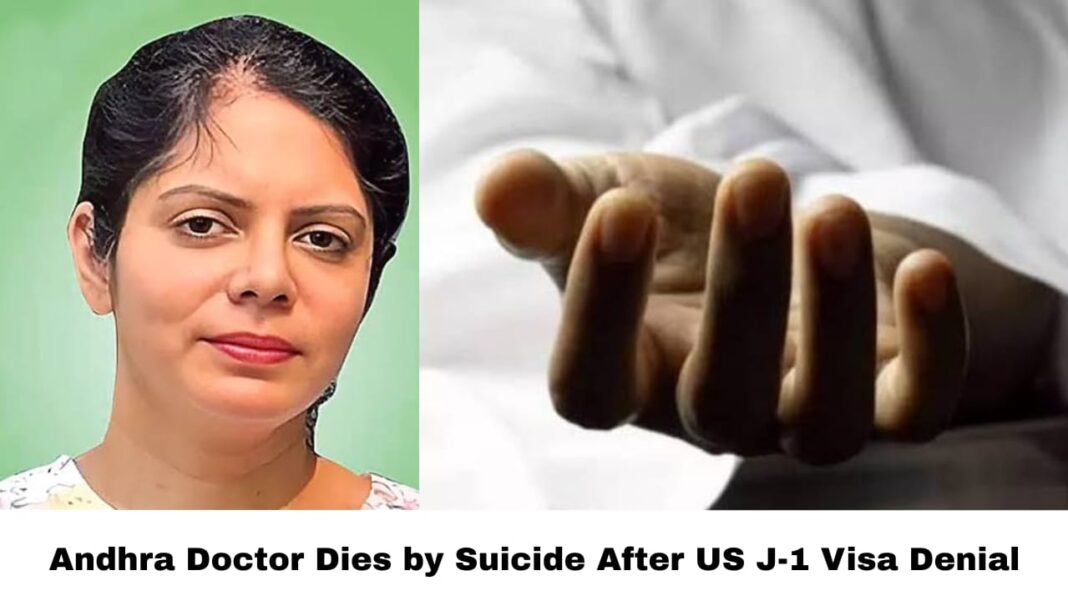Digital News Guru Andhra Pradesh Desk:
A Promising Doctor, A Crushed Dream
A 38-year-old woman doctor from Guntur district in Andhra Pradesh — identified as Rohini — has died by suicide at her flat in Padmarao Nagar, Hyderabad, after allegedly being unable to cope with depression triggered by the rejection of her U.S. visa application.
Rohini had long nurtured dreams of moving to the United States to further her medical career: she had completed her MBBS abroad and was preparing for a specialization in internal medicine.
Her mother, identified as Lakshmi, said that Rohini had been “eagerly waiting” to go to the U.S. — believing that practicing medicine there would offer better opportunities, income, and professional growth.
The Final Days: Depression, Isolation, Rejection
According to police and family accounts, Rohini had been trying for nearly a year to secure a U.S. visa — reportedly a J-1 visa — to undertake her planned medical residency.
Her preparations were thorough. She had cleared the required licensing steps (as reported by family), and had even reportedly secured placement in a U.S. residency program.

Tragically, despite these steps, her visa application was rejected — reportedly in the final round. The family says that this denial devastated her.
Her mother says Rohini argued that in India, though she could practice medicine, the scope and income were limited compared to what she believed she could achieve abroad.
In recent weeks, Rohini’s disappointment had grown deeper. Her mother described her as increasingly mentally exhausted, isolated, and dejected as she awaited visa approval that never came.
It was in this context of shattered dreams and deep despair that she apparently took the irreversible decision.
Depressed Over US Visa Refusal: Andhra Woman Doctor’s Final Note
On Friday night, Rohini is suspected to have taken an overdose of sleeping pills — or alternatively, may have injected herself, according to preliminary police reports.
Her flat was in Padma Rao Nagar, an area in Hyderabad where she lived alone. On Saturday, when she failed to respond to knocks on her door, domestic help alerted her family. On breaking the door open, her family found her dead.
A suicide note was recovered from the residence. According to police, the note reportedly referred explicitly to her depression and the frustration over the visa rejection.
After a post-mortem, her body was handed over to her family. The local police — Chilkalguda Police — have registered a case, and an investigation is underway.
The Dream Abroad — Why It Mattered So Much
Rohini’s ambition to go to the U.S. was not impulsive. According to her mother, Rohini had earned her MBBS degree abroad (reports vary — some say Kyrgyzstan, others Russia), and maintained excellent academic records.
She prepared intensively for the licensing and residency process, cleared requisite exams (as per family), and was reportedly selected for a U.S. residency program.

To her, the U.S. represented opportunity — not just professional growth, but also stability, better pay, and the chance to fully realize her potential as a doctor specializing in internal medicine.
Her mother recounted that she had repeatedly asked Rohini to practice in India — but Rohini responded that working in India would limit her both financially and professionally.
It was this stark gap between aspiration and reality — between a hard-earned opportunity abroad and the visa rejection — that seems to have weighed heavily on her.
Beyond One Life — What This Tragedy Reflects
The horrifying end to Rohini’s life is not just a singular tragedy; it reflects broader issues faced by many professionals who seek to go abroad for better opportunities.
Emotional and Psychological Strain
Visa rejections, especially after long months or years of preparation, can deliver a crushing emotional blow. For ambitious professionals who invest time, money, and hope into such plans, the denial can trigger depression and despair. Rohini’s suicide note, which allegedly referenced her depression and visa denial, testifies to this.
The Pressure of “Making It” Abroad
Many Indian professionals — doctors, engineers, academics — view emigration as the path to a better future. The logic is understandable: better pay, better facilities, stability, and wider professional scope. For someone like Rohini, trained overseas and seeking specialization, the U.S. may have seemed like the right dream.
That dream — if dashed — can shatter self-worth, future plans, and emotional well-being.
Lack of Adequate Support Systems
Being physically far from family or home — living alone in a city like Hyderabad — can amplify feelings of isolation and despair. After the visa rejection, Rohini reportedly grew increasingly isolated and mentally exhausted.
This raises urgent questions about mental-health support for individuals under high stress: professionals, immigrants, people in transitional phases of life.
What Her Family — and Society — Lose
A bright, well-educated doctor has lost her life. A career, built painstakingly over many years, has ended in silence. And beyond that, a family suffers an unrepairable loss.
For society, this incident raises red flags. Are we doing enough to support mental health — especially among those chasing big dreams abroad? Are visa and migration systems — and their emotional consequences — being considered when decisions are made?

The Need for Awareness and Support
This tragedy should serve as a wake-up call. While many pursue opportunities abroad, the personal toll of rejection — professional, emotional, psychological — must not be underestimated.
- There is a need for mental-health awareness and accessible support, particularly for people under pressure: students, doctors, professionals preparing for licensure or migration.
- Families and friends need to be aware that disappointment — even if it seems “external” (visa denial, career hiccup) — can lead to deep internal turmoil. Compassion and open communication matter.
- Society — employers, professional bodies, even governments — must recognise that behind every statistic (visa denials, job failures) there are human beings with hopes, fears, and vulnerabilities.
A Life Cut Short — And a Call to Reflect
The suicide of Rohini is a tragedy that shocks and saddens. It is a painful reminder that dreams, ambitions, and professional aspirations — even when backed by talent and preparation — can be fragile.
But more than that, it is a call for empathy and awareness. In a competitive world, where chasing “success abroad” is often glamorised, we must remember the human cost of rejection: broken dreams, emotional despair, and lives lost.
May Rohini’s story remind us to look beyond achievement and ambition — to pay attention to mental health, human dignity, and the value of a life.
You May Also Read: Public Health Alert: Ultra-Processed Foods Pose Growing Global Risk








